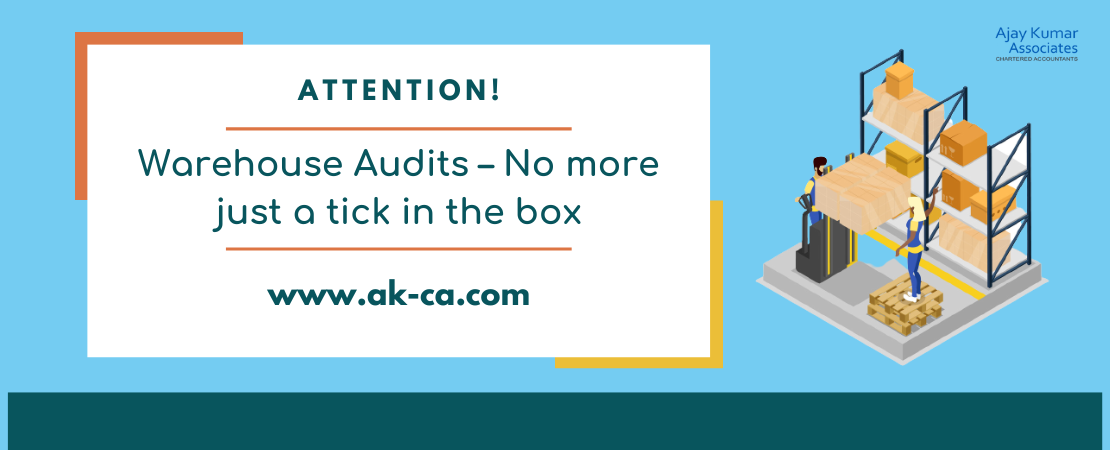Warehouse Audits – No More Just a Tick in the Box
Does running your business include managing fully equipped warehouses yourself or through clearing and forwarding agents? Managing them efficiently and effectively can be a huge task. Operating warehouses is an integral part of the distribution channel to get your goods to channel partners and customers. Current business environment demands for fast, dynamic, and flexible logistics solutions and hence more the need to have proper governance across the processes. Here is where warehouse audits play and important role.
To get assurance of
the operations, warehouse audits need to be conducted regularly. The frequency
depends on the products sold, warehouse size, operational complexity and other
challenges which are specific to businesses.
Warehouse audits help
businesses to:
a) get
a confirmation on the existence of inventories as represented in the books of
account
b) get
insights into the quality of operations at the warehouses
c) get
a confirmation on compliance to laws
d) to
improve processes
Traditionally,
warehouse audits aimed to just count the inventory and match it with book stock
using manual verification and comparison techniques. But now, the audits do
much more than that.
Our audits also focus
on:
a) Analytics
based reviews
b) Benchmarking
between warehouses and scoring them on parameters and sharing best practices.
c) Root
cause analysis and process improvement.
So,
here is what we are going to discuss in detail in this blog:
- What is
a warehouse or depot audit?
- How
often should you conduct warehouse or depot audits?
- Why
should you conduct warehouse or depot audits?
- What is
a warehouse audit checklist?
- Why
should you let us do your warehouse or depot audit?
- How do
we conduct a warehouse or depot audit?
Let’s understand what
a warehouse or depot audit is.
1.What
is a warehouse or depot audit?
Similar to other
audits conducted in a business, a warehouse or depot audit is a step-wise
inspection to keep an account of the material that the company has. It is
important to conduct a warehouse or depot audit because it helps you gauge
performance and efficiency.
Sometimes, you may
feel that a warehouse or depot audit is completely unnecessary but you should
understand that spending some time conducting this audit may help you save a
lot of time and money later. By conducting a warehouse audit, you can be sure
that safety protocols are followed, and inventory is accurately accounted for.
This will ensure your operations run smoothly.
A warehouse audit is
key to ensuring that the supply chain runs successfully. Let’s look at how
often you should conduct a warehouse or depot audit.
2.How
often should you conduct warehouse or depot audits?
Are you looking to
improving the efficiency of your warehouse in the near future? If so, you
shouldn’t be conducting a warehouse once in a year or once in a really long
time. The warehouse audit should be conducted regularly.
But this does not
mean that you need to stop all warehouse functions to conduct the warehouse or
depot audit. You can break the entire process into manageable portions so that
you can get it done perfectly without disrupting the company’s operations or
customer requirements.
Perform warehouse
audits quarterly or even month to month. Instead of really taking a look at
each and everything in your whole distribution center at the same time, spot check
high-volume stockpiling racks as often as possible for quality control. Take a
stock count and cross-reference it with stock records as a component of your
ordinary cycle before they transform into enormous scope issues.
Now, let’s take a
look at why you should conduct warehouse audits.
3.Why
should you conduct warehouse or depot audits?
There are several
important reasons as to why you should conduct a warehouse or depot audit
regularly. Here are a few of them:
i.
Understand the problem quickly before it gets uncontrollable
Given that you will
have your stock or materials in the warehouse, there will be several issues
that crop up over time. To avoid bigger concerns, it’s better to understand the
small issues, note them, figure out solutions early to ensure that they do not
occur again. Prevention is always better than cure. In the case of your
warehouse, it is even more important to prevent problems than worry about them
later. You do not want your customers to come to you with complaints and cancel
agreements.
ii.
Cost and process control
If you have a
warehouse that contains a lot of material, especially material that may get
damaged over time, it is better to have an account of it. This will help you
avoid loss of money due to damage to your goods in the depot or warehouse.
Moreover, you will be able to control the processes based on your warehouse
audit report.
Through an audit of
process control, your warehouse can develop “best practices” for each
department and the warehouse as a whole. For example, if certain staff are not
following the proper processes for order selection, a process control audit
will reveal this.
iii.
Maintain the quality
A quality audit will
uncover, for instance, whether orders which should be isolated are taken care
of appropriately. Are the quality guidelines that are stressed widely across
the company being adhered to in your warehouse or depot?
iv.
Control and manage inventory
Is the accessible
space used to its greatest advantage? Good managers make the progress from
stock control to stock administration. They start to see stock as cash, instead
of items. They search for ways of working to the organization's benefit. Is
there stock in the stockroom that can be disposed of with no client grumblings?
This helps in moving from just control to a broad mentality. This will help the
company and business to develop over time.
We know that you are
looking to conduct a warehouse or dept audit soon. We will provide you with a
checklist that you can maintain while you conduct the audits. You won’t miss a
thing!
4.What
is a warehouse audit checklist?
Before you conduct
your warehouse or depot audit, here’ the checklist that you need to have.
Follow the checklist and make sure to get the answers to all the questions.
This will help you have a successful and useful warehouse audit.
→ Know
the purpose of the audit
You should be clear
about the reason behind the audit. Why are you conducting the warehouse audit?
What is it that you want to focus on? Make sure you are clear about these
objectives before conducting the audit.
→ Know
the physical inventory
Make sure you have an
account of your physical inventory. For this, your systems should be in place
and you should know the amount of stock you have versus the stock you should
have ideally had.
→ Understand
the operations
You should know how
operations run in your company and your warehouse. How are your employees
adhering to the safety protocols or are they really following the guideline
given to them? You should have answers to these questions when you are conducting
an audit.
For this, you may
have to:
→ Talk
to your employees
It is important to
communicate with your employees. This will give you ground-level information on
what’s happening in your company, the processes they follow, etc. They may also
surprise you by pitching in certain brilliant ideas to improve the processes.
→ Evaluate
audit results and implement required changes
Once you have the
audit results, you need to spend time understanding them. The report shouldn’t
be shelved to take a look later because there may be problems that need to be
addressed immediately.
While this may seem
simple, it is a tiresome process to follow every time you want to conduct a
warehouse or depot audit. That’s why we can help you with it.
5.Why
should you let us do your warehouse or depot audit?
We follow
step-by-step processes when it comes to conducting an audit. It does not matter
what audit we are conducting, we have a clearly defined procedure.
Here’s why you should
rely on us to conduct an effective warehouse or depot audit for you:
- We have
a comprehensive checklist-based approach
- We
enable comparison through an evolved rating process
- We fix
benchmarks and KPIs for depot performance based on rating
- We make
reports and ratings available online through an interactive portal
6.How
do we conduct a warehouse or depot audit?
As mentioned earlier,
we have a step-by-step procedure to conduct a warehouse or depot audit. We
divide into four parts:
- Physical
verification
- Transaction
review
- Compliance
review
- Other
necessary checks
- Physical
verification
Physical verification
includes:
→
Physical verification of good stock, freebies, gifts, promos, Fixed Assets
→
Stock Interchanges – Batch and PKD
→
Stock maintenance
→
Cut-off procedures
- Transaction
review
Transaction review
includes:
→
Inbound/outbound transactions review
→
In-transit transaction accuracy
→
Unaccounted stocks review
→
Transaction completeness review
- Compliance
review
Compliance review
includes:
→
Statutory compliance
→
Cycle count review
→
Policy compliance review
→
Documentation completeness review
→
Pre and post-audit checklist
- Other
checks
This includes:
→
General upkeep and maintenance
→
Safety, health and environment parameter review
→
Lease, insurance
→
Root cause review and improvement status
Once we complete all
these checks, we conclude the warehouse audit and submit the report to you.
Also, we conduct audits across all places in India. Our teams will spend
sufficient time understanding your needs and figuring out solutions to your
problems.
Want to conduct a
warehouse or depot audit?
We
at Ajay Kumar Associates are prepared to help you find the right solutions to
meet your warehouse organization and depot management needs. We provide
services such as real-time inventory management, depot audit, returns
processing, and more. Reach out to us and let’s get talking!

